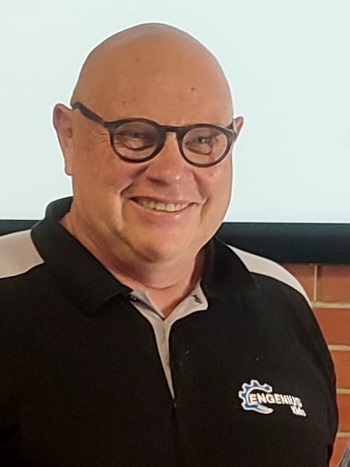They are the best of the best … of the best, sir. The preceding sentence might find its origins in the 1997 science-fiction comedy Men in Black, but there is no denying that the sextet of Joshua van Zyl, Etienne Kruger, Niël Gertenbach, Jean du Toit, Rynhardt Engelbrecht and Henri Kock are a blockbuster engineering team.
In December 2022, these six NWU students won the People’s Prize in the prestigious Engineering Without Borders: Engineering for People Design Challenge and were crowned the overall runners-up of the international competition.
Their winning streak began even before the competition: they had to beat 43 other teams from the Faculty of Engineering before taking on their nation-wide competitors.
For their entry, the NWU students focused on the challenge of food security in the Cape York region of Australia.
Their project proposed an aquaponics system for the region. They called the system Aquamundi, which is an amalgamation of the words “aquaponics” and ”barramundi”, the latter being the fish they proposed be introduced into the aquaponic system.
Simply put, aquaponics is a unique and sustainable food production method combining aquaculture (raising fish) with hydroponics (growing plants in water).
The nuts and bolts of the competition
All NWU third-year engineering students take a module called “Engineering in context, local and international”. One of the outcomes of this module is participation in the International Design Challenge as prescribed by Engineering Without Borders.
“In groups of six, our students investigate the engineering challenges of a specific international community,” explains Hannes du Toit, senior project manager at the Faculty of Engineering.
After receiving some background information and case studies about a specific community, the students have the freedom to identify a topic that they want to address, ranging from recycling to infrastructure.
The winning mix that clinched the victory
“Winning the Engineering for People Prize and being the overall runners-up of the competition reflects the creativity of our team and the ability to apply the theory from class debates on different topics. It also shows the determination to make a real difference in the community with a practical, executable plan,” says Hannes.
Their teamwork was also an X factor. “All six team members were dedicated and contributed to the winning mix.”
In the process, they had great fun, while applying every rule in the book. “The team had self-confidence, a thorough presentation and were well-prepared and ready for any question from the judges. They also had a great sense of humour to keep the judges’ attention,” says Hannes.
Well done, team
In what certainly ranks as the highest of endorsements, Hannes says if he had his own engineering consulting business, he would employ the whole NWU team to run it.
He says they are highly employable and will take any company to higher levels with their energy, dedication, quality of work and ability to stick to deadlines.
“As they are currently final-year students, the engineering profession will have fresh, brilliant, balanced engineers to employ next year. I hope the industry will appreciate such talent.”
Solutions: one size does not fit all
Hannes also says that engineering in context is very important.
“As an engineer, you have to serve the community and be sensitive to the beliefs, cultures and community dynamics before you suggest a solution.”
“Three years ago, the international Engineering Without Borders team chose a neighbourhood in the south of Johannesburg. The following year, the challenge focused on an area in Peru, and last year all the teams had to find solutions for the Cape York area in Australia.
“The similarities of poverty in all the countries are in a way similar, but adding culture to the mix makes it extremely difficult to prescribe the same solutions internationally.”

The cream of the engineering crop ... the award-winning students are from left Jean du Toit, Niël Gertenbach, Etienne Kruger, Henri Kock, Joshua van Zyl and Rynhardt Engelbrecht.

Hannes du Toit is a project manager in the Faculty of Engineering.
